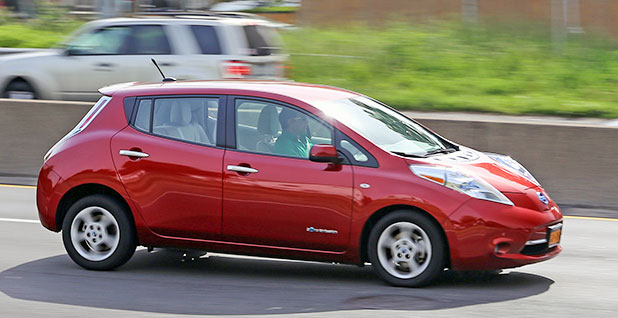The planet is already experiencing huge impacts from the increasing heat caused by our emitting heat trapping gasses, primarily CO2 and methane. The consequences are going to get much worse due to the amount of these compounds we’ve already emitted but also what we will inevitably put into the atmosphere in the next 10 years and beyond. And while we have and opportunity to mitigate the worse possible outcomes, huge changes in our society are coming. The combination of government actions around the world (and eventually here in the US once the Republicans are out of control) and industry reactions will drive massive reallocations of human and financial capital.
As I have been warning and predicting for quite a while now, the time is finally here when carbon related assets and investments are beginning to feel the “heat” of climate change. The science, prediction models and facts “on the ground” are becoming undeniable and universally accepted. (At least outside the White House and Republican Party.) And as this awareness becomes obvious, financial markets are responding in anticipation as the “flood” of impacts is becoming pervasive.
If you haven’t done anything to shift and protect your financial security it’s not toooo late but it IS becoming so. The market is finally beginning to price climate risk into current values. A seismic shift is gaining momentum so I hope you’re preparing financially for the coming tsunami.
““ESG risk is absolutely starting to hit and it’s spreading like wildfire across all asset classes,””
“The announcement by Moody’s last week — saying it was considering stripping US oil major ExxonMobil of its triple A credit rating, flagging risks in its adjustment to a lower carbon economy — marks a watershed.”
“Last year, Moody’s identified 11 sectors, with a combined $2.2tn in rated debt, as being in danger of a downgrade owing to concerns over carbon.”
“Redburn, the London-based equity research house, recently removed all its “buy” ratings from the biggest integrated oil companies, arguing that the industry faces an “existential risk” that is not reflected in longterm forecasts for oil demand. Exxon-Mobil was hit with a double downgrade, falling to a “sell” rating in one fell swoop.”
“In a downgrade of Ford in September, the agency cited the potential for “large emission penalties in 2020 and 2021” as part of the reason for docking the car-maker to junk status.”
“Banks, for example, do not typically have much direct exposure to environmental risks, yet their loans to fossil-fuel companies could be threatened by carbon taxes, according to research published this month by BlackRock, the world’s biggest funds firm with $7tn under management.”
“The European Investment Bank, the lending arm of the EU, pledged this month to cut off funding to oil, gas and coal companies on the expectation that regulation and emerging technology will upend the sector.
“I think we’re going to hear a lot more talk in the next couple of years about environmental liabilities crystallising much sooner than we thought and there’s a cost to that,” said Mr Lewis. “These liabilities are bigger than the value they’re shown at on balance sheets today.””
“it was only a matter of time before governments take more forceful action to meet climate-related commitments.”
Moody’s announcement marks watershed moment for debt issuers on ESG concerns
BILLY NAUMAN — NEW YORK ANNA GROSS — LONDON
ExxonMobil’s operations have been the subject of a warning from Moody’s
Essam Al-Sudani/Reuters
Debt issuers ignore ESG at their peril. The announcement by Moody’s last week — saying it was considering stripping US oil major ExxonMobil of its triple A credit rating, flagging risks in its adjustment to a lower carbon economy — marks a watershed.
Concerns over environmental, social and governance standards are most acute in the fossil fuel sector, where companies have been under increased pressure from regulators, activists and investors.
However, the world’s efforts to hit emissions targets will pose a threat to many more industries’ creditworthiness, including some that do not directly emit much carbon, according to the top rating agencies.
Last year, Moody’s identified 11 sectors, with a combined $2.2tn in rated debt, as being in danger of a downgrade owing to concerns over carbon.
“ESG risk is absolutely starting to hit and it’s spreading like wildfire across all asset classes,” said Mark Lewis, Paris-based head of climate change investment research at BNP Paribas Asset Management. “People . . . need to be thinking sooner rather than later about how to revamp their business models to cope.”
ESG factors were not the primary driver in the Moody’s downgrade to its outlook for ExxonMobil, the biggest energy company in the world by market capitalisation, from stable to negative.
Pete Speer, an analyst, cited its negative free cash flow, weak margins and a rising reliance on debt to fund operations. But in a rare move, the New York-based rating agency explicitly cited ESG concerns as an “emerging threat” to the company.
“A strong financial position and low financial leverage are important characteristics for managing these environmental and social risks,” Moody’s wrote.
The other big credit rating agencies have also sharpened their focus on ESG.
S&P Global made a splash last week by buying the sustainability research arm of RobecoSAM, a Swiss asset manager, in a bid to capitalise on increasing demand for data on sustainable investments.
Fitch introduced ESG “relevance scores” this year to show how its credit rating decisions are influenced by such factors. It issued a warning for the Brazilian agriculture sector this month, explaining that an international backlash over this year’s Amazon wildfires could spark boycotts of the country’s beef and threaten the EU-Mercosur trade deal.
Equity analysts have been alert to greater political pressures, particularly in energy. Redburn, the London-based equity research house, recently removed all its “buy” ratings from the biggest integrated oil companies, arguing that the industry faces an “existential risk” that is not reflected in longterm forecasts for oil demand. Exxon-Mobil was hit with a double downgrade, falling to a “sell” rating in one fell swoop.
As for Moody’s, its report last year on sectors at risk for heightened ESG concerns included shipping, steel, carmakers and other big carbon emitters.
In a downgrade of Ford in September, the agency cited the potential for “large emission penalties in 2020 and 2021” as part of the reason for docking the car-maker to junk status.
Even non-emitters are under the microscope. Banks, for example, do not typically have much direct exposure to environmental risks, yet their loans to fossil-fuel companies could be threatened by carbon taxes, according to research published this month by BlackRock, the world’s biggest funds firm with $7tn under management.
The European Investment Bank, the lending arm of the EU, pledged this month to cut off funding to oil, gas and coal companies on the expectation that regulation and emerging technology will upend the sector.
“I think we’re going to hear a lot more talk in the next couple of years about environmental liabilities crystallising much sooner than we thought and there’s a cost to that,” said Mr Lewis. “These liabilities are bigger than the value they’re shown at on balance sheets today.”
Market participants said a lack of data was the biggest hurdle they faced in trying to sift ESG laggards from leaders, a recent Moody’s survey found.
Companies are making progress on disclosing more relevant metrics, particularly with respect to emissions, but quantifying the financial effects of climate risks “remains at a nascent stage,” the rating agency wrote.
Still, many investors are in no doubt that such metrics will stay in focus.
The UN Principles for Responsible Investment, a group that counts thousands of asset owners as signatories, said it was only a matter of time before governments take more forceful action to meet climate-related commitments.
It predicted bans on coal and internal combustion engines, as well as a wider uptake of carbon pricing policies.
“The advice we’ve been giving to companies is, ‘Be aware,’” said Chris Kocinski, senior portfolio manager at Neuberger Berman in Chicago, which signed up seven years ago. “From our perspective, it’s a material part of how we assess credit risk.”



